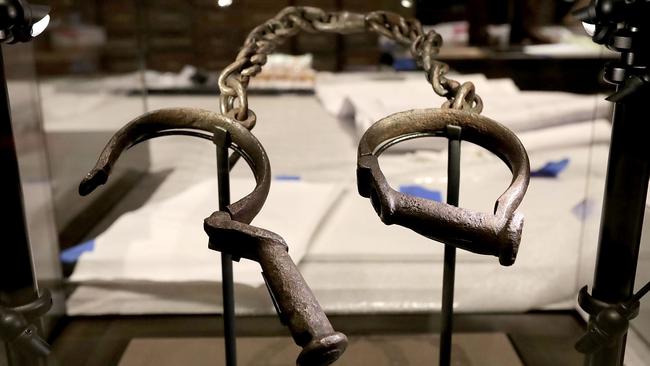Some British universities are looking into their past links with slavery
Conscience-stricken British universities are looking into their past associations with slavery, and the benefits they gained from it.

Every year, in early December, Jesus College, Cambridge, hosts the Rustat Feast. The tables in hall are lit with candles. There is wine, and music from the college choir. The assembled diners raise a glass to Tobias Rustat, whose generosity three centuries ago allowed generations of orphans to go to Cambridge and be ordained as Church of England clergymen.
Then, last November, just before the latest feast, Rustat’s name was quietly dropped from the jollities.
Rustat was a courtier to King Charles II. John Evelyn, a contemporary diarist, described him as “a very simple, ignorant, but honest and loyal creature”. Rustat was also a big investor in the Royal African Company (RAC), which trafficked more African men, women and children to the Americas than any other British institution. According to one historian, in the half-century after it was founded in 1672 the RAC shipped close to 150,000 enslaved Africans, mostly to the Caribbean.
When they think of their role in the history of slavery, Britons like to focus on William Wilberforce and his fellow abolitionists rather than on the role of slavery in building the British Empire during the previous two centuries.
That is changing. Pushed by student activists and inspired by work done, among others, by Brown University, Yale and Georgetown, to uncover the slave-owning beginnings of America’s earliest colleges, in Britain universities are taking the lead. University College London (UCL) has created a database of British slave-owners which has been critical in pushing institutions, in higher education and beyond, to look into how they benefited from slavery and the slave economy.
To persuade MPs to support the Slavery Abolition Act, which was passed in 1833, the government borrowed £20 million from Nathan Mayer Rothschild, a banker, and his brother-in-law, Moses Montefiore, to compensate slave-owners for the loss of what was considered their property.
The loan accounted for 40 per cent of the Treasury’s annual income in 1834, the year the payments began — or about 5 per cent of Britain’s GDP. It took until 2015 to pay it off. UCL’s database names more than 46,000 slave-owners who got compensation; it can be searched by name, village, county, occupation, religion or number of slaves owned.
Beneficiaries were spread all over the country, but the biggest concentration was in Scotland, whose young men had for decades gone to make their fortunes in the Caribbean. Some had become big landowners or businessmen engaged in shipping, finance and insurance, but many were ordinary middle-class citizens who owned, say, just one or two slaves whom they were happy to rent out for work-gangs on plantations across the Caribbean.
Many British slave-owners, among them thousands of widows, were upstanding members of Victorian society; they also championed civic causes, particularly education.
After London, the biggest concentration was in Bristol, Edinburgh, Glasgow and Liverpool, which is one reason why universities in most of those cities have taken the lead in studying their connections with slavery.
Bristol, the centre of the Wills tobacco fortune and the site of an elegant but controversial statue of Edward Colston, a wealthy slave trader, has just appointed Britain’s first professor of the history of enslavement, memory and the politics of memorialisation of the past — Olivette Otele, a Cameroonian historian who was trained at the Sorbonne.
Last year Cambridge announced a university-wide study. “History is inescapable,” said Stephen Toope, the vice-chancellor.
Dons at three Cambridge colleges are listed in the slave-compensation scheme, but so far only Jesus College — Rustat’s father’s alma mater — has hired researchers to look into its links with slavery. The University of Nottingham is doing a similar study. Aberdeen will soon do the same, and Hull is expected to follow. St Andrews and Edinburgh universities are the rare silent exceptions.
But it was Glasgow, whose former rector, Robert Cunninghame Graham, had once been a slaver, that kicked things off, setting a high bar.
After releasing a forensic study in 2018 which showed that 23 donors, whose family fortunes came from slavery or trade in slave-produced goods, had given £11,325 (equivalent to almost £20m today) to the university between 1866 and 1880 to build its new campus in the west of the city, the university turned to the thorny issue of what, if anything, should be done to atone for this bloody largesse.
Opinions ranged from nothing at all (“Some historical injustices are just too distant,” wrote Nigel Biggar, director of Oxford University’s Ethics and Empire project last year) to a formal apology and paying of widespread reparations to slave descendants.
Glasgow decided on a program of “reparatory justice” instead of reparations. It teamed up with the University of the West Indies (UWI) to create a new initiative, the Glasgow-Caribbean Centre for Development Research in Kingston, Jamaica.
The program focuses on three areas: research into health care, particularly diabetes, which is endemic to the Caribbean; into the degradation of the environment, especially along the coasts around the islands; and the creation of an online history museum that will be accessible to the whole region.
At the suggestion of UWI, Glasgow has promised to raise £20m — a symbolic figure — for the project over the next two decades. “People like to see their institution doing the right thing,” says the university’s chief operating officer, David Duncan. “This was the right thing to do.”
Glasgow’s approach may indeed be ethical, but it is also self-interested. The university hopes that it will be helpful when it applies for funding for its Caribbean initiative to global bodies, such as the Global Challenges Research Fund and the Bill and Melinda Gates Foundation, which assess applications on a competitive basis. And for an institution whose business is study, studying its past wrongdoings hardly counts as penance.


